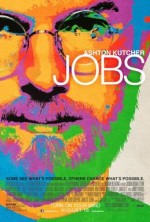Jobs

Not that we need a movie to tell us, but it took a huge amount of talent, skill, and luck for a brash young man to introduce personal computers to the world and build the most successful electronics company in history from nothing. Almost as much talent, skill, and luck as it took to make to turn the story of those events into an incredibly dull film.
Steve Jobs (Ashton Kutcher) became enough of an icon prior to his passing in 2011 that the facts of his life have become something of a modern myth: the founding of Apple Computer in his garage; his ouster from the company several years later, due at least in part to his expensive perfectionism; his final triumphant return, reversing the company’s long descent. If you were trying to write a rags-to-riches story (or, at least, middle class-to-riches) story in the classic Hollywood underdog role, you couldn’t ask for a better model than Jobs’ relationship with Apple.
The people behind Jobs the film certainly seems to think so, at any rate. Purportedly an examination of the man’s life itself and how he was able to do what he did, it quickly ditches any hope of insight in favor of re-enacting the greatest hits of the rise of Apple.
We should be able to get the hint that is what they intend right from the beginning, as a middle-aged Jobs prepares to introduce the iPod for the first time amid forced, soaring music in the kind of cliché biopics have been peddling forever (which sums up much of the experience of watching Jobs). From there it flashes back to a younger, hairier Jobs, with whom we will spend much of the film, the bulk of which is devoted to the founding of Apple and Jobs’ initial ouster from it in 1985. And occasionally, to his relationships with actual human beings.
Kutcher himself has eerily perfected an imitation of Jobs that is at once recognizable without being an impersonation. You will never forget you’re looking at an actor, but you will always know you are looking at Steve Jobs. In fact, writer Matt Whiteley and director Joshua Stern (Swing Vote) have a knack getting right into the heart of their scenes, using them to show off exactly the side of the character they want. And the three of them together have got Jobs absolutely nailed, from his foresight and brashness to his peevishness and temper, even if they have to regularly fall back on plodding tropes of the genre (particularly the soundtrack, which recycles almost every song played in a movie set in the 1970s).
It’s not just Jobs, either. The film is well cast, with Josh Gad and Dermot Mulroney in particular turning in some of their best performances as Steve Wozniak and Mike Markkula. Not coincidentally, they tend to bring the best of Kutcher, as well. Nor does the film shy away from Jobs’ darker aspects, such as his refusal to acknowledge his biological daughter for several years or withholding ownership in Apple from several of its earliest employees, as it builds him up as his own worst enemy.
Ultimately, however, it has no idea what to do with any of this. And when it doesn’t know what to do, it fills space with a montage. Jobs’ trip to India, a foundational part of his young adulthood (for which the crew actually went and filmed with the actors in India)? Montage. Jobs’ wooing of Pepsi CEO John Sculley (Matthew Modine), with whom he would one day vie for control of Apple? Montage. The dozen years between his exit from Apple and his return, during which time he bought Pixar, got married and started a family, mended his relationship with his daughter, and generally became a more stable person? Montage.
These are hallmarks of a film which either did not come together the way its makers intended or where the filmmakers didn’t have a plan to bring it together to start with. The result is a patchwork of scenes slapped together, with little drive to keep your interest on it.
It’s not a bad movie; the performances are generally spot on, and Jobs’ life story is hard to make boring all of the time (just most of it, it turns out). But Stern and company have managed the task of taking an actually interesting narrative and draining it like a vampire, with nothing to show for their results but a wasted two hours. That’s some sort of feat, but it’s not a good one.
Cast: Ashton Kutcher as Steve Jobs; Josh Gad as Steve Wozniak; Dermot Mulroney as Mike Markkula; J. K. Simmons as Arthur Rock; Matthew Modine as John Sculley; Lukas Haas as Daniel Kottke; Victor Rasuk as Bill Fernandez; Eddie Hassell as Chris Espinosa; Ron Eldard as Rod Holt; David Denman as Al Alcorn; John Getz as Paul Jobs; Lesley Ann Warren as Clara Jobs; Kevin Dunn as Gil Amelio.



Leave a Reply